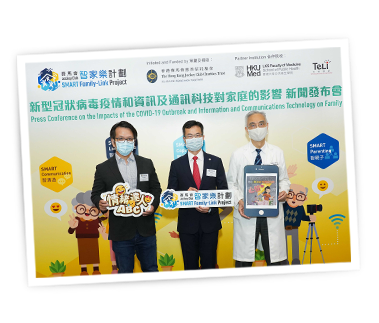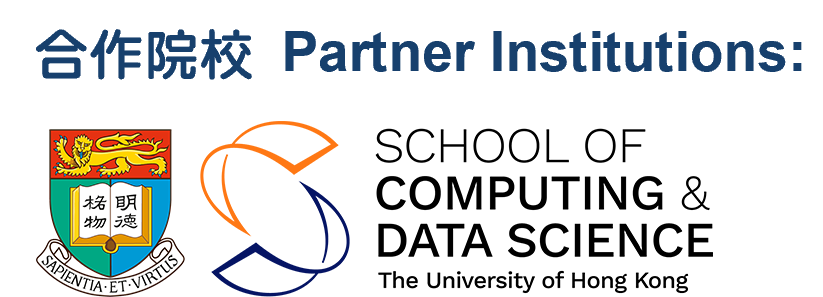
Media Events
Press Conference on the result announcement of the ‘Impacts of the COVID-19 Outbreak & Information and Communications Technology on Family’ Survey 2020 (7th July 2020)

“Impacts of the COVID-19 Outbreak & Information and Communications Technology on Family” Survey 2020
(7 July 2020, Hong Kong) The COVID-19 pandemic led to school closures and many adults working from home. This meant increased contact among household members but, at the same time, limited interaction with other family members due to social distancing measures. Unprecedented changes to daily life could bring about physical and mental pressures, as well as family problems. Thus, the “Jockey Club SMART Family-Link Project” (“The Project”) team from the University of Hong Kong (“HKU”) conducted a survey on the “Impacts of the COVID-19 Outbreak & Information and Communications Technology on Family”. The survey results were released today.
Initiated and funded by The Hong Kong Jockey Club Charities Trust, the Project is in collaboration with HKU’s School of Public Health and the Technology-Enriched Learning Initiative and non-governmental organisations. The Project aims to encourage members of the public and social welfare units to apply more elements of Information and Communications Technology (ICT) in promoting family well-being as well as apply the use of ICT in the work of Integrated Family Service Centres with a view to promoting family harmony.
Mr Leong Cheung, Executive Director, Charities and Community of The Hong Kong Jockey Club said that ‘family’ was the basic unit of society, therefore The Hong Kong Jockey Club has always supported the effective use of information technology to promote innovative family services and family harmony. “While face-to-face family services cannot be rendered as usual during the epidemic, the Project was able to help. Apart from developing fun and family-friendly online games which enable family members to make use of technology to obtain accurate information, the Project also encourages family members to exercise together to enhance interaction. In addition, frontline social workers can also make use of the electronic messaging platform to keep in touch with service users, encouraging them to use positive thinking to resolve problems and maintain family harmony.”
The survey, which was conducted online in late May, successfully interviewed more than 4,900 people. The results are summarised as below:
- 82.3% of respondents shared information on COVID-19 with family members regularly using text-messaging and 65.6% of them did so face-to-face at the peak of the pandemic.
- At the peak of the pandemic, 54.0% of respondents always shared information on COVID-19 with their family members.
- 93.7% of respondents reported that the use of ICT rendered some help during the pandemic. Among the respondents, more females and those aged 65 or above reported that the use of ICT rendered some help during the pandemic.
- 16.0% of respondents reported that the use of ICT brought about negative impacts during the pandemic. Such negative impacts included confusion about information that was hard to verify (11.5%) or information overload (10.2%).
- At the peak of the pandemic, 76.1% respondents received COVID-19 information from online TV, radio, newspaper and magazine. More female respondents received COVID-19 related information from social media, while more male respondent from TV, radio, newspaper, magazine, websites and online forum. Sex differences were small.
- More respondents aged 18-44 years received COVID-19 related information from online forums. No age group differences were found with instant messaging tools.
- 59.7% of respondents reported that the COVID-19 outbreak had brought negative impacts to their family (including themselves). The negative impacts included reduced family income (37.8%), increased negative emotions in the family (33.6%), reduced family happiness (19.1%) and reduced family harmony (12.2%).
- 24.1% of respondents reported that there were some helpful aspects to their family (including oneself) during the pandemic [due to the efforts spent to combat the pandemic], including improved family hygiene (17.8%), improved family health (11%), increased family harmony & positive emotions, and improved family resilience in times of hardship (10.6%). Among these, more female respondents reported that their family relationships and family mental health improved [due to the efforts spent to combat the pandemic].
Professor Lam Tai-hing, BBS, JP, Principal Investigator of the Jockey Club SMART Family-Link Project and Sir Robert Kotewall Professor in Public Health, Chair Professor of Community Medicine of School of Public Health, Li Ka Shing Faculty of Medicine, HKU, said that instant text-messaging was the most commonly used method among Hong Kong families to share information on COVID-19 with their family members when the outbreak was serious. With family gatherings being inevitably cut down, the use of ICT to maintain close relationships with family members locally or overseas is vital. Communications across time zones and borders in real time not only provides a valuable opportunity for family members to exchange accurate and trustworthy pandemic prevention tips, it is also important for us to stay closely connected, in order to overcome the fear and anxiety due to the pandemic.
Professor Ricky Kwok Yu-kwong, Co-Investigator of the Jockey Club SMART Family-Link Project and Professor of Department of Electrical and Electronic Engineering, HKU, shared practical tips on how to stay in touch with family members and show care during the pandemic. He said making good use of ICT in family communications during the pandemic facilitates the building up of family resilience. That refers to how family members can turn stress into a source of motivation for parents and children to stay stronger as they grow to be more flexible in adopting e-resources for learning and communication in making the extended home-time worthwhile and relieving anxiety brought about by the pandemic. Together with many partners, the Jockey Club SMART Family-Link Project has long been devoted to providing a wide variety of ICT resources, including but not limited to family-friendly mobile game applications, gamified ICT tools, and e-messages, with the aim of helping social welfare organisations and members of the public promote family harmony. The Project Team also encourages a positive attitude while tackling all the pandemic-related challenges ahead of oneself and the family – when in need, both online and offline professional advice and aid from Integrated Family Service Centres (IFSCs) and Integrated Service Centres (ISCs) can be sought to help us cope with such uncertainties.
The Project has long been encouraging social welfare organisations to apply ICT in their routine work at IFSCs and ISCs. At present, the Project is assisting 26 IFSCs/ISCs operated by non-governmental organisations in Hong Kong to enhance their family services leveraging ICT and ultimately instill an attitudinal change among frontline workers – so that social workers are motivated to adopt more ICT elements in case management and interventions. The Project Team has thus initiated and co-created a series of i-Action programmes which provides hardware, software and technical support to the social service sector.
A representative of the Hong Kong Family Welfare Society (HKFWS), a registered social worker at one of the Project’s partnering IFSCs, Ms. Hinia Yeung, shared that workers from her centre, including herself, were well-equipped to use ICT tools provided by the Project even before the novel coronavirus outbreak. They have continued to ride on the experience they gained previously to utilise the Project’s e-message Portal and launch the “10-Day e-Chicken Soup Express” campaign, in which e-messages were dispatched to service users via the online platform. Frontline workers, although not being able to meet their users face-to-face, can maximize the opportunities to help service users regulate their emotions and impart positive thoughts via the e-messages, coping with challenges together with their users’ families during difficult times.
Another social worker, Ms. Haze Lam, from International Social Service Hong Kong Branch (ISSHK) Sham Shui Po (South) Integrated Family Service Centre, also said that their IFSC centre took the initiative to compile a “SMART Online Learning Platform” to host various e-learning resources which aimed to encourage and motivate family members to keep in vibrant contacts via ICT. Even though the pandemic caused disruption to routine work, as a partner of the Jockey Club SMART Family-Link Project, the centre’s social workers were long accustomed to using ICT in their family service delivery to meet the new challenges.
– END –




Copyright © Jockey Club SMART Family-Link Project. All Rights Reserved. 版權所有




